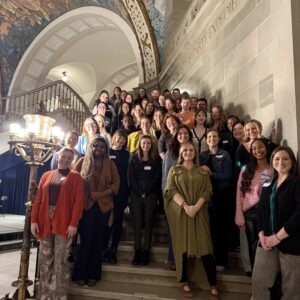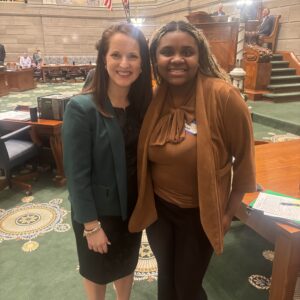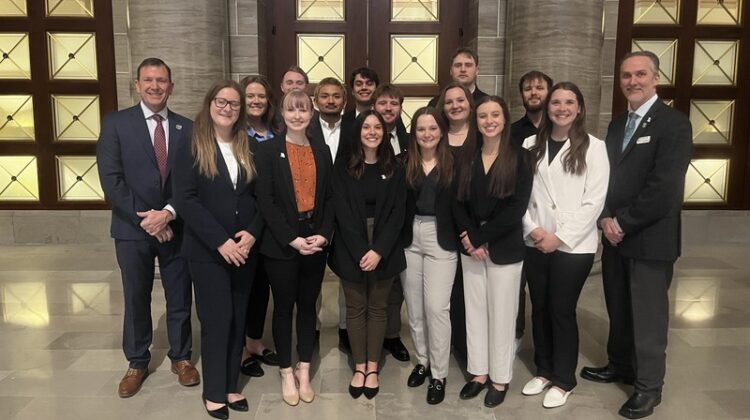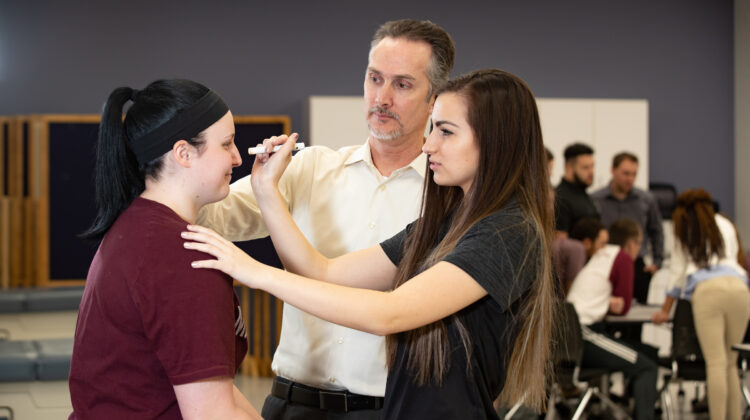For many students, advocacy may seem distant and reserved for professionals, but Missouri State University students are learning to make their voices heard — in class and at the state Capitol.
Two recent events gave social work and athletic training students a chance to engage with Missouri’s legislative process.
A big day for social work students

On March 4, around 50 social work students attended the Behavioral Health Professions Rally at the Missouri State Capitol in Jefferson City. During the event, they heard inspiring messages from Rep. Aaron Crossley and Rep. Melanie Stinnett.
Students got to sit in both the House and Senate sessions. They watched lawmakers in action during the legislative process.
“We want students to see that their voice matters,” said Salina Bollinger, clinical assistant professor in the School of Mental Health and Behavioral Sciences. “We want them to leave knowing they can make a difference.”
Besides Bollinger, three other faculty members, Natalie Curry, Stacy Johnson and Heather Eckhart supported the students at the Capitol.
The faculty encouraged students to choose issues they care about, such as mental health and child safety. Since many of the students are involved in practicum placements, they understand the real needs of the people they serve.
“This was my third time attending and each year brings something new and powerful,” said Victoria Kleene, a social work graduate student. “It’s inspiring to see advocacy in action and understand how our classroom learning can drive real policy change.”
For Kersten Shuler, also a social work graduate student, asking questions and hearing directly from lawmakers helped her better understand how the legislative process really works.
“The experience was empowering, and it sparked a deeper interest in advocacy,” she said.
A surprise moment on the Senate floor

One special moment stood out during the visit. Sen. Maggie Nurrenbern introduced Ketsia John, a Bachelor of Social Work student and Social Work Club president, to the Senate.
The moment was even more meaningful because of their past connection. Nurrenbern was once John’s high school teacher in Kansas City.
The recognition reminded everyone in the room that advocacy often begins with relationships and a strong sense of community.
Athletic training students get their turn
On March 5, 15 Master of Athletic Training students participated in the advocacy day for health care-related issues.
Dr. W. David Carr, professor in the School of Health Care Professions, and Dr. Michael Hudson, professor in sports medicine and athletic training, led this event. Both encouraged students to focus on relationship building rather than pushing for new legislation.
“This visit was about gratitude and connection with lawmakers who support our profession,” said Carr. “We wanted students to see how advocacy works, not just by asking for change, but by showing appreciation.”
The group also had the opportunity to speak with university President Dr. Richard Biff Williams, who was at the Capitol for the university and to show support for athletic training (he is an athletic trainer).
Students met with six lawmakers who supported bills related to school safety and athletic health. They thanked each legislator and handed them a “Friend of Athletic Training” certificate in appreciation.
“Talking to legislators helped me see how policies directly impact what we do,” said graduate student Kate Forward. “It reminded me we’re not just practitioners; we’re part of the larger conversation in our field.”
Why advocacy matters
To prepare for the Capitol visit, social work students joined online sessions with National Association of Social Workers resources. Athletic training students received guidance in class and reviewed materials from the Missouri Athletic Trainer’s Association.
“This experience helps students overcome fear and step into advocacy with confidence,” said Bollinger. “It helps them see that advocacy is part of their professional responsibility.”
Both programs plan to continue these annual advocacy events for students to find their voice and lead change.
“Students gain more than knowledge; they gain courage,” Carr said. “This is how leadership begins.”


